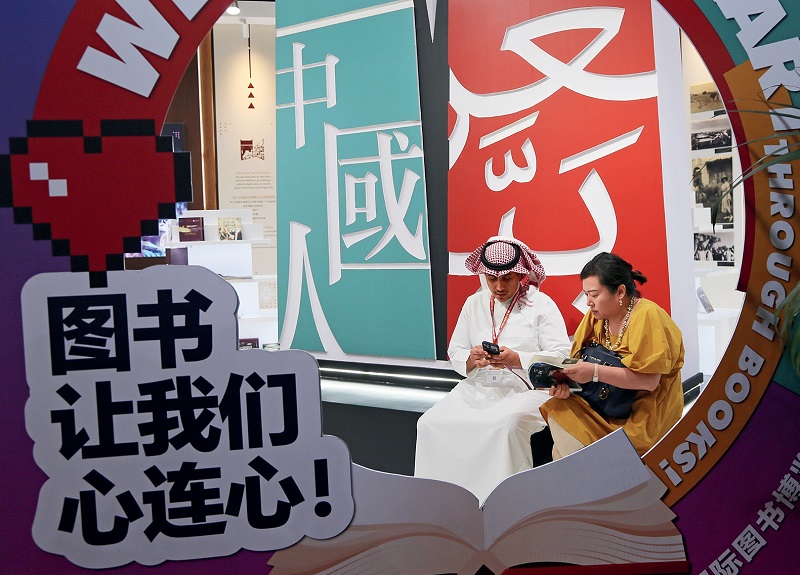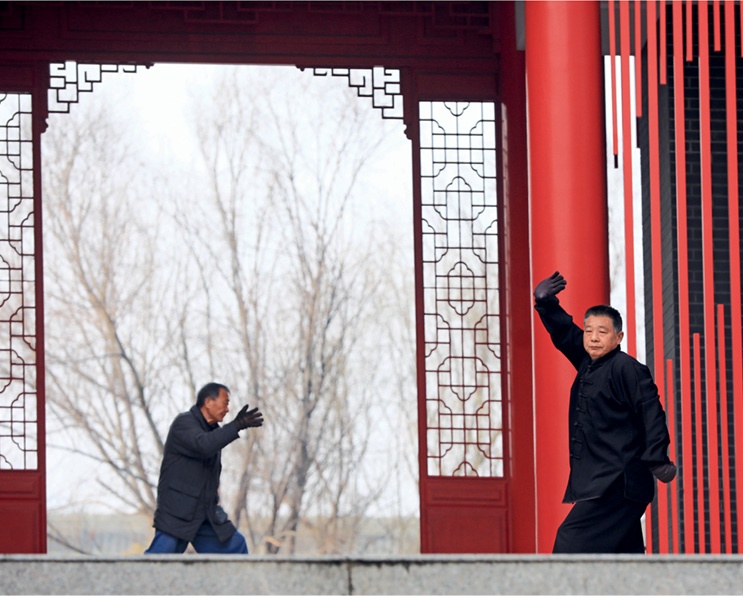
The 30th Beijing International Book Fair is held at the China National Convention Center in Beijing’s Chaoyang District in June 2024.

When I first arrived in China nearly 19 years ago, it wasn’t just about moving to a new country. It was the start of an incredible journey that changed how I see life, success, and human nature. I wanted to see how different cultures understand life and happiness and how ancient wisdom connects with modern psychology.
After 14 years of research in psychology and deep experiences in China, I found that Arab culture, Chinese wisdom, and positive psychology are deeply connected. There is an invisible thread that ties them together, blending Arab patience, Chinese balance, and modern scientific thinking.
This unique combination offers powerful lessons on how to live a happy and successful life.
In Arab culture, patience is more than just a good quality, it’s a survival skill, and it gives people the strength to keep going, even when life gets tough. Arabic proverbs and stories always remind us that those who endure the hardest times are the ones who succeed in the end.
When I started learning about Chinese philosophy, I found a similar idea but with a different approach. In China, people talk about “无为 wu wei,” which means going with the flow. Faced with difficulties, they believe in adapting wisely. It’s not about giving up, but about finding balance and moving smoothly with life’s natural rhythm.
Modern research confirms that the key to success and happiness is psychological flexibility, which is the ability to accept challenges while staying mentally strong.
So, which is better? Should we endure hardships with patience or flow with life’s changes? The answer is both. Arab patience helps us stay strong and Chinese flexibility teaches us how to adapt. Together, they create a powerful mindset for dealing with life’s ups and downs.
Defining True Happiness
According to positive psychology, happiness isn’t just about avoiding sadness; it’s about feeling good, having meaningful relationships, and achieving personal goals. This idea fits perfectly with Chinese philosophy, which says that true happiness comes from living in harmony with nature and society.
In Arabic culture, happiness is linked to inner peace and contentment. The idea of "contentment" teaches us to be grateful for what we have instead of always chasing more.
Modern psychology also shows that gratitude is one of the most effective ways to increase happiness. Instead of focusing on problems, being thankful helps us see the good in life.
Chinese wisdom adds another important idea, which is “inner harmony”: Happiness comes from balancing the body, mind and soul. This is why meditation and deep thinking help people feel calmer and more connected to themselves.
In the Arab civilization, generosity is not just about giving money, it’s about giving time, emotions, and support. It is believed that kindness and generosity bring love and strengthen communities.
The Chinese civilization follows a concept called “人情 ren qing,” which is about fairness in relationships. It means that people in a relationship should give and receive equally, no one should feel they are giving too much or being taken advantage of.
Positive psychology also supports this idea. Research shows that healthy relationships are based on mutual respect and balance. We need to give love, but we also need to set boundaries while trying to make others happy.
After living in China for years, I realize that the best relationships mix both ideas: the Arab spirit of giving and the Chinese wisdom of balance so that we give with open hearts, but also protect our energy and well-being.
In Arabic tradition, courage and leadership are highly respected values. Arabs are raised to be bold, take responsibility, and make big decisions with confidence.
In Chinese wisdom, success is based on discipline and slow, steady progress. The famous Chinese saying “A journey of a thousand miles begins with a single step” explains this well. Instead of making big, risky moves, the Chinese believe in taking small, consistent steps toward success.
Modern psychology supports this idea too. Studies show that success isn’t just about passion; it’s about sticking with your goals over time.
Courage and discipline alone are not enough as true success comes from balancing both. We need the courage to take action and the patience and discipline to see things through.
The more I studied psychology and different philosophies, the more I realized people aren’t just looking for success, they are looking for meaning. Deep down, we all ask the same questions: Why am I here? What is my purpose?
Arabic wisdom reflects this in the saying “If the reason is known, the wonder disappears.” In Arab culture, knowledge and reflection are ways to make sense of life’s mysteries.

Early risers practice tai ji in Bochishan Park in Huai’an City, Jiangsu Province.
What Taoism Teaches Us
As part of China’s cultural legacy, the search for meaning takes a different form. It is about accepting life’s natural flow instead of trying to control everything. This idea is best represented by ”Tao,” which is the unseen force that connects everything.
The Chinese believe that instead of fighting life, we should flow with it, just like a river moves smoothly through its path.
Positive psychology agrees. It teaches that happiness comes not just from achievements, but from living in alignment with our values and purpose.
Like rivers flowing from different lands, Arab and Chinese wisdom merge with modern psychology, creating a powerful current of knowledge that guides us toward a balanced and fulfilling life. These timeless philosophies, shaped by centuries of human experience, are echoed in today’s scientific discoveries, proving that the quest for happiness, resilience, and success is universal.
As science continues to unveil the mysteries of the mind, ancient wisdom stands as an unwavering lighthouse, illuminating the path with lessons etched in history. The true art of living lies in weaving the depth of the past with the precision of the present where tradition and innovation dance in harmony, unlocking the secret to a life rich in meaning, purpose, and inner peace. 
A. AFFES is a Tunisian psychology expert and researcher.